| Srl | Item |
| 1 |
ID:
057599
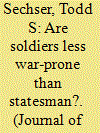

|
|
|
| 2 |
ID:
127901
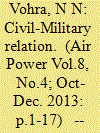

|
|
|
|
|
| Publication |
2013.
|
| Summary/Abstract |
I am very happy to have been asked to deliver the USI national Security Lecture 2013 and to speak on "Civil-Military Relation Opportunities and Challenges".
Before I proceed to reflect on the theme of taday's lecture, I think it would be useful to have reasonable clarity about what exactly do we have in mind when we use the term "civil military relations". I say this because earlier this year, at a seminar held in a defence think-tank at Delhi, a statement was made that "unsatisfactory civil-military relation are having an adverse impact on the functioning of the military in India". While all those who may be involved in studying military matters would understand that this statement refers to the functioning of the defence apparatus, I feel that a free use of the term "civil and military relations" should be best avoided as its has the potential of causing altogether unfounded doubts and suspicions in the minds of millions of people in India.
|
|
|
|
|
|
|
|
|
|
|
|
|
|
|
|
| 3 |
ID:
151112
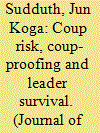

|
|
|
|
|
| Summary/Abstract |
Under what conditions do political leaders enact ‘coup-proofing’ strategies? There is a broad consensus in the literature that political leaders who face a higher risk of a coup will employ coup-proofing strategies that reduce the military’s capabilities to organize a coup. A closer look at the theory and empirical analyses of earlier studies, however, suggests that the presumed relationship between coup risk and coup-proofing should be re-examined. Drawing on insights from formal studies of authoritarian power-sharing, this article proposes that political leaders become less likely to initiate coup-proofing efforts as the coup risk increases. The reason is that leaders’ coup-proofing actions in themselves could prompt the military to launch a coup and thus political leaders will hesitate to offend officers when they face a high risk of a coup. The statistical models in this article estimate a latent coup risk by aggregating multiple indicators that capture the military’s willingness and ability to organize a coup. The empirical results strongly support the proposition that coup-proofing efforts taken by leaders decrease as coup risk increases.
|
|
|
|
|
|
|
|
|
|
|
|
|
|
|
|
| 4 |
ID:
156482


|
|
|
|
|
| Summary/Abstract |
In recent years, prominent voices in the Israeli academic and political arenas have
increased their criticism of the Israeli Defense Force’s (IDF) dominant role in policy
and decision-making processes in the country. The 1967 Six–Day War is perhaps
the bedrock upon which IDF critics’ fears of a dominant military rest upon. They
disapprove of the pressure that the military’s high command put on the government
to go to war and argue that the IDF was overly dominant in determining its
goals and strategic moves on the battlefield. The following analysis debunks the
claims of IDF critics by presenting historical evidence that shows how political
considerations overrode military calculations on the way to and during the war. It
also highlights the vital contribution of the IDF’s high command to decision-making
at significant crossroads. In this regard, the analysis uses organizational theory logic
to question the suggestion of IDF critics to empower the National Security Council
(NSC) so it could provide the government with alternative analyses and courses
of action to those suggested by the IDF. Significantly, the analysis concludes
that by empowering the NSC at the expense of the IDF, the government might
invite confusion rather than clarity and efficiency to policy and decision-making
processes, especially in times of crises and war—when quick decision and action
are necessary.
|
|
|
|
|
|
|
|
|
|
|
|
|
|
|
|
| 5 |
ID:
106100


|
|
|
| 6 |
ID:
031752


|
|
|
|
|
| Publication |
Boulder, Westview Press, 1988.
|
| Description |
ix, 342p.
|
| Standard Number |
0861879678
|
|
|
|
|
|
|
|
|
|
|
|
Copies: C:1/I:0,R:0,Q:0
Circulation
| Accession# | Call# | Current Location | Status | Policy | Location |
| 030683 | 322.50904/FIN 030683 | Main | On Shelf | General | |
|
|
|
|
| 7 |
ID:
099152
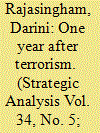

|
|
|
| 8 |
ID:
057690


|
|
|
| 9 |
ID:
097318


|
|
|
|
|
| Publication |
2010.
|
| Summary/Abstract |
How effective was the Indian government in sending clear, coercive signals and orchestrating them into coherent messages during 'Operation Parakram' in 2001-02? This study finds that compellence was hampered by three factors: (1) the government kept changing its demands; (2) the lack of adequate civil-military coordination; and (3) the government engaged in a dual-track policy of direct coercion of Pakistan, while simultaneously engaging the United States to put pressure on Pakistan. Ultimately, these two policy strands worked at cross-purposes to each other.
|
|
|
|
|
|
|
|
|
|
|
|
|
|
|
|
| 10 |
ID:
105689
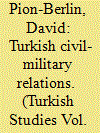

|
|
|
|
|
| Publication |
2011.
|
| Summary/Abstract |
This article compares civil-military relations in Turkey and Latin America. It finds that in both cases, military interruptions of democratic rule have been justified on grounds of military guardianship over national values and interests and feelings of professional superiority over civilians. It also finds that while the Turkish military ruled for brief periods, relying instead on extracting legal constitutional guarantees to maintain influence, Latin American militaries ruled for lengthier periods with less constitutional rewriting. In recent years, militaries in both places seem more willing to accept civilian policies even if they disagree with them.
|
|
|
|
|
|
|
|
|
|
|
|
|
|
|
|
| 11 |
ID:
105845
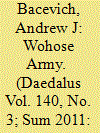

|
|
|